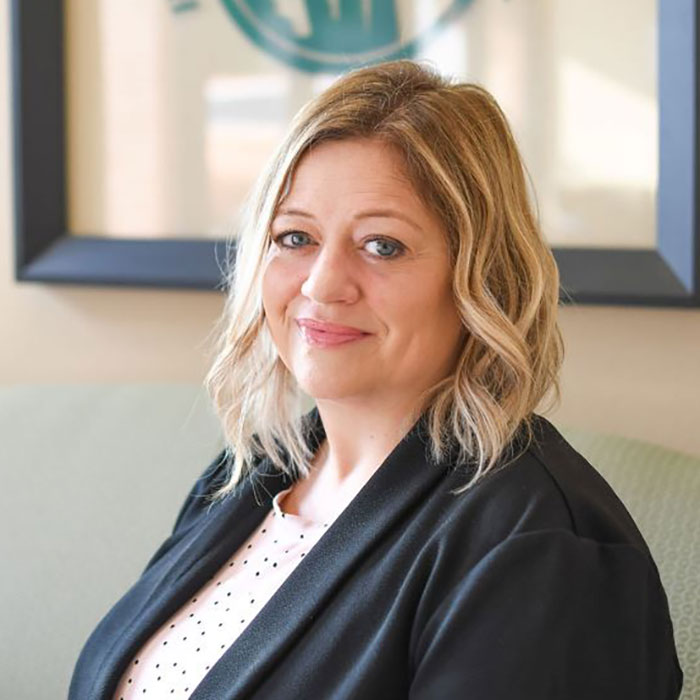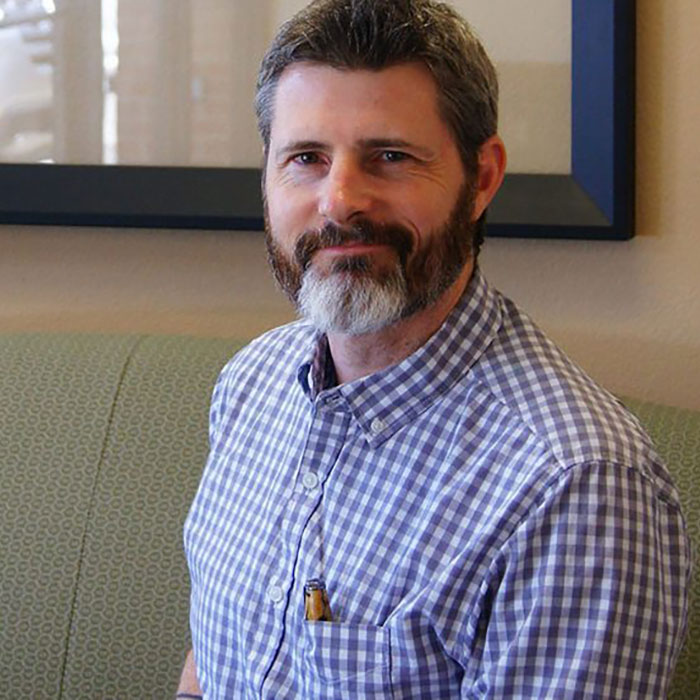Birch Tree Services
Birch Tree Communities provides a full continuum of care through a range of clinical, rehabilitative, and life enrichment services. These services are aimed at encouraging members to re-enter the community with new skills and offering hope for greater satisfaction with the quality of their lives.
The continuum of care provided at Birch Tree Communities includes residential services to meet the challenges of living situations for those with severe mental illness. Residential options such as group and transitional homes are available for members that need supportive housing.
Christie Owen, LPC is the Chief Clinical Officer – South and is responsible for the oversight of all clinical services provided at the Malvern, Hope House, Benton Town, AHC, Evergreen, and Clinton branches of Birch Tree Communities.
Dr. Chris Jackson is the Chief Clinical Officer – North and is responsible for the oversight of all clinical services provided at the Conway, Russellville, Clarksville, Mountain View, Newport, and Oxford branches of Birch Tree Communities.


Services Offered Include:
Case Management
Group Therapy
Family Therapy
Advocacy
Artistic Experience
Outpatient Psychotherapy
Crisis Intervention/Stabilization
Educational Opportunities
Medication Management
Transportation Services
Pre-vocational Training
24-hour Supervision
Supportive Housing
Illness Management
An integral component of psychosocial rehabilitative day treatment is illness management. The focus of recovery is to help individuals accomplish their aspirations, which can include improving socialization, working or volunteering in the community, living independently, re-establishing relationships, having a voice, being part of a community, and experiencing a sense of belonging. Psychosocial groups and activities occuring in day treatment are built upon the concepts of illness management:
- Coping skills for symptom management
- Medication education
- Skills for managing symptoms in the community/society
- Problem-solving regarding stigma and relating about mental illness to others
- Progress toward successful integration/reintegration into the community
Birch Tree Communities structures program activities to focus on illness management and its components. Members are provided educational materials to help with skills development in these areas. Illness management services are provided by trained and experienced program personnel, and related activities are provided off-site when possible. Some examples of psychosocial groups and activities include:
- Community Integration
- Development of Self
- Medication Management
- Illness Management
- Recovery
- Pre-vocational Skills
- Co-Occurring Disorders
- Social Skills
Life Enrichment
The Therapeutic Value of Trips, Outings, and Vacations
Although little statistical information is available regarding the efficacy of incorporating therapeutic outings, mental health experts agree about the importance of vacations and trips in mental health rehabilitative treatment. According to articles documented by Psychiatric Services, there are obvious benefits to incorporating leisure activities into treatment. Birch Tree Communities has always promoted and facilitated life enrichment activities, including trips, outings, and vacations, for members.
Severe and persistent mental illness can contribute to an individual’s sense of isolation. Adults with serious mental illness receive structured, goal-oriented, predefined treatment of mental illness, but often opportunities to participate in outside social and recreational activities are limited. Often, stigma or need for structure and supervision prohibits mentally ill individuals from participating in community-based outings, trips, and vacations.
In order to experience a satisfying and fulfilling life, mentally ill individuals must have needs and interests addressed in addition to clinical treatment and illness management. Leisure activities provide an opportunity for life enrichment.
Trips and outings can produce goal-attainment or symptom management and often result in positive therapeutic outcomes and rehabilitation. These activities can give members a sense of purpose, empowerment, hope and enjoyment, meaning, and opportunities to connect and reconnect with others. Participating in social and community activities can reduce anxiety and isolation, assist with social and communication skills, reduce symptom impact, and improve overall functioning and satisfaction.
Appropriate Birch Tree Communities staff attend and participate in group outings and activities. Staff are available to provide brief interventions, structure where needed, assistance in managing and addressing member needs, assistance with medication and money issues, crisis intervention when needed, and a safe, enjoyable atmosphere.
Trips to Memphis and Branson, camping, lakes and oceans, theme parks, museums, libraries, community events, county and state fairs, rodeos, concerts and film festivals are just a few examples of the excursions in which members participate.
Member comments regarding a camping trip:
“I loved sitting around the campfire just talking.” — R.V.
“I had my first canoe ride. This was my first camping trip since I was five.” — R.M.
“It gives you a different outlook on life when you participate in something so normal.” — R.V.
“I felt normal when I was camping.” — A.M.
Pols, Ph.D., J., & Kroon, Ph.D., H. (2007). The Importance of Holiday Trips for People With Chronic Mental Health Problems. Psychiatric Services, (Open Forum), pp. 1-9 . Retrieved October 15, 2007, from Psychiatric Services database.
Rehabilitative Day Treatment
Birch Tree Communities embraces a progressive treatment philosophy that places members living with severe and persistent mental illness at the center of the treatment and recovery process. Primary goals of treatment are:
- to enable members to realize their worth and dignity as individuals
- for each member to participate in developing and directing their own recovery processes
- to assist each member to recognize and build upon their strengths, enhance their abilities, develop self-awareness and personal insight
- to teach members to articulate and pursue dreams, make personal choices and decisions, and learn from experiences
- to prepare members to live, work, and socialize successfully in the community
Rehabilitative Day Treatment provides a structured, supervised environment in which the treatment team can collaborate with members to facilitate recovery through psychoeducational groups and activities, skills development, and functional improvement.
U.S. PSYCHIATRIC REHABILITATION ASSOCIATION STANDARDIZED DEFINITION OF PSYCHIATRIC REHABILITATION:
Psychiatric rehabilitation promotes recovery, full community integration and improved quality of life for persons who have been diagnosed with any mental health condition that seriously impairs their ability to lead meaningful lives. Psychiatric rehabilitation services are collaborative, person directed and individualized. These services are an essential element of the health care and human services spectrum, and should be evidence-based. They focus on helping individuals develop skills and access resources needed to increase their capacity to be successful and satisfied in the living, working, learning, and social environments of their choice.
REFERENCE SOURCE: U.S. Psychiatric Rehabilitation Association Media Release dated October 4, 2007.
Organized Outings & Events
Special events are coordinated by Birch Tree Communities to assist members in relating to others and successfully integrating/reintegrating into society. In addition to planned trips and outings, annual events are hosted to bring members from branches across the state together in fellowship and fun.
Annual Events include:
- Expressions Art Show
- Dances
- Family Day
- Family Education Workshops
- Field Events Day
- Camping Trips
- Fundraisers
- Chili & Willie Cook-Off
Spirituality in Mental Health
Recovery-oriented services take into consideration an individual’s spiritual and religious needs. Although spirituality in treatment is often considered a holistic approach, opposed to traditional clinical approaches, concepts related to spirituality in mental health recovery are not new. Integrating issues relevant to spirituality in mental health treatment can help treatment providers facilitate recovery and person-centered treatment. Spirituality can provide guidance, social supports, opportunities for celebration, and can offer meaning in lives. A more holistic approach to treatment now accepts faith and prayer as effective health treatments. Recovery-oriented treatment focuses on self-determination, choice, and self-defined needs.
Birch Tree Communities facilitates a respectful and individualized approach to each member’s spiritual needs. Individual and group services focus on spirituality and its impact on recovery. For those individuals who wish to have spiritual concerns or goals included in treatment, services target utilizing strengths related to spirituality to enhance empowerment, coping, hope, community integration, purpose, connection to others, and personal enrichment.
Residential Services
Individuals with severe mental illness often have difficulty accessing safe, affordable housing. The need for structure, support, and intervention often adds to the challenge of living situations. Birch Tree Communities provides a continuum of care that includes residential services, assistance with accessing safe and affordable housing, staff support when needed, and the most independent living environment possible for each member.
Residential settings range from an intensive, highly structured, secure facility to independent living in the community. The care continuum facilitates the assimilation of members into community living, based on the individual stage of recovery, preferences, and accessibility.
Staff supported group homes are located near program centers to offer members opportunities for learning skills that assist with the transition into more independent living situations. Branches offer community-integrated housing opportunities, ranging from staff supported living, group home living that provides small, home-like environments, to completely independent living situations. Birch owns and operates several community-based apartment complexes that provide members with opportunities to live in new, safe, affordable and attractive homes. Residential settings are determined based on each individual’s acuity level, need for structure/support, preferences, and independent living skills.
